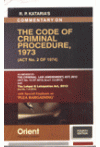- Author(s): R.P. Kataria
- Publisher: Orient Publishing Company
- Edition: 4 Ed Rp 2016
- ISBN 10 8187197617
- ISBN 13 978818719761407
- Approx. Pages 2096 + Contents
- Delivery Time Normally 7-9 working days
.............................................................................................................................
Description
As amended by The Criminal Law (Amendment) Act, 2013
(Act No. 13 of 2013) (w.e.f. 3.2.2013) and
The Lokpal & Lokayuktas Act, 2013 (Act No. 1 of 2014)
With Special Empasis on "PLEA BARGAINING"
complete system of positive law care-fully arranged and officially promulgated, a systematic collection or revision of laws, rules or regulations. As per Black's Law Dictionary, "Procedural Law" means the rules that prescribed the steps for having a right or duty judicially enforced, contrary to the law that defines the specific rights or duties themselves. "Criminal Procedure" means the rule governing the mechanism under which crimes are investigated, prosecuted and punished. It includes the protection of accused person's constitutional right, In British Rule there were different sets of provisions whichgoverned procedure of Criminal Courts in Presidency-towns and the Provinces. In 1882, the Code of Criminal Procedure, 1882 (10 of 1882), was placed on the Statute Book. This enactment for the first time gave a uniform procedural law to the whole of India including both the Presidency towns and the Provinces. Subsequently the Criminal Procedure Code, 1898 (Act 5 of 1898), was enacted. The Code of Criminal Procedure, 1898 also has been repealed by the Parliament and newly enacted Code of Criminal Procedure, 1973 (Act 2 of 1974), has come into force. While there were 562 Sections in 1898 Code there are only 484 Sections in the 1973 Code.The main thrust of bringing this new legislation was to separate judiciary from the executive in order, to achieve uniformity in the criminal justice, administration throughout India. This Code is a code of procedure and, like all procedural laws is designed to further the ends of justice and not to frustrate them by the introduction of endless technicalities. Though this commentary on the Code of Criminal Procedure, 1973 is concise one, but it is exhaustive on the subject. Every point has been dealt with. The synopsis of every section has been given below the section to make it easy for a reader to find out the topic which he want to read. For quick reference on any point an exhaustive subject-index is being given at the end of the book. Clarity, brevity and correctness have been main guides in the whole book.
.............................................................................................................................
Contents
I. Preliminary
II. Constitution of criminal courts and offices
III. Power of courts
IV. A - Powers of superior officers of police
B - Aid to the magistrates and the police
V. Arrest of persons
VI. Processes to compel appearance
A - Summons
B - Warrant of arrest
C - Proclamation and attachment
D - Other rules regarding processes
VII. Processes to compel the production of things (Ss. 91-105)
A - Summons to produce
B - Search-warrants
C - General provisions relating to searches
D - Miscellaneous
VII-A. Reciprocal arrangements for assistance in certain matters and procedure for attachment and forfeiture of property
VIII. Security for keeping the peace and for good behaviour
IX. Order for maintenance of wives children and parents
X. Maintenance of public order and tranquility
A - Unlawful assemblies
B - Public nuisances
C - Urgent cases of nuisance or Apprehended danger
D - Disputes as to immovable property
XI. Preventive action of the police
XII. Information to the police and their powers to investigate
XIII. Jurisdiction of the criminal courts in inquiries and trials
XIV. Conditions requisite for initiation of proceedings
XV. Complaints to magistrates
XVI. Commencement of proceedings before magistrates
XVII. The charge
A - Form of charges
B - Joiner of charges
XVIII. Trial before a court of session
XIX. Trial of warrant-cases by magistrates
A - Cases instituted on a police report
B - Cases instituted otherwise than on police report
C - Conclusion of trial
XX. Trial of summons-cases by magistrates
XXI. Summary trials
XXIA. Plea bargaining
XXII. Attendance of persons confined or detained in prisons
XXIII. Evidence in inquiries and trials
A - Mode of taking and recording evidence
B - Commissions for the examination of witnesses
XXIV. General provisions as to enquiries and trials
XXV. Provisions as to accused persons of unsound mind
XXVI. Provisions as to offences affecting the administration of justice
XXVII. The judgment
XXVIII. Submission of death sentences for Confirmation
XXIX. Appeals
XXX. Reference and revision
XXXI. Transfer of criminal cases
XXXII. Execution, suspension, remission and commutation of sentences
A - Death sentences
B - Imprisonment
C - Levy of fine
D - General provisions regarding execution
E - Suspension, remission and commutation of sentences
XXXIII. Provisions as to bail and bonds
XXXIV. Disposal of property
XXXV. Irregular proceedings
XXXVI. Limitation for taking cognizance of certain offences
XXXVII. Miscellaneous
Schedules
.............................................................................................................................

